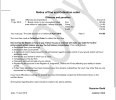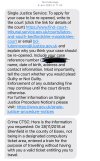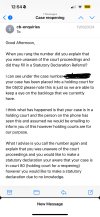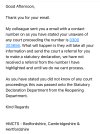I’m not sure where to start. In 2021 I had deductions from my salary listing the reason as a court ordered fine which was obtained by someone else using my details (I’m guessing) on 28/11/2018. I called around and paid the balance, £418 and asked to appeal on the grounds of having no idea what it was regarding. I didn’t know at the time but the fine details were wrong, the address, date of birth and first name were close but not correct.
The court ordered fine and collection order was issued under that wrong name and date of birth. Only now that the court has agreed to list for an application to reopen the case, I have seen this document with the wrong details.
I’ve asked for more details, a time, a description of the traveller, a signature, anything surrounding the fine that will help me prove it wasn’t me. It’s so long ago, I can’t just say it wasn’t me because I doubt they would have kept CCTV. I was at a spa that day and night but without knowing the time of the fine, it’s hard to prove it wasn’t me because the fine location was just over an hour from where I was so it’s not impossible to travel to and from.
I’m not sure what evidence I can give to justify the court reopening the case because I don’t have anything to go off, being that I don’t have any ideas apart from the date and station. I am also annoyed that a court ordered fine can be issued without validating any of those details and I’m guessing the court just decided “close enough” and assigned it to me.
I’m not sure what to do and how to proceed.
The court ordered fine and collection order was issued under that wrong name and date of birth. Only now that the court has agreed to list for an application to reopen the case, I have seen this document with the wrong details.
I’ve asked for more details, a time, a description of the traveller, a signature, anything surrounding the fine that will help me prove it wasn’t me. It’s so long ago, I can’t just say it wasn’t me because I doubt they would have kept CCTV. I was at a spa that day and night but without knowing the time of the fine, it’s hard to prove it wasn’t me because the fine location was just over an hour from where I was so it’s not impossible to travel to and from.
I’m not sure what evidence I can give to justify the court reopening the case because I don’t have anything to go off, being that I don’t have any ideas apart from the date and station. I am also annoyed that a court ordered fine can be issued without validating any of those details and I’m guessing the court just decided “close enough” and assigned it to me.
I’m not sure what to do and how to proceed.









